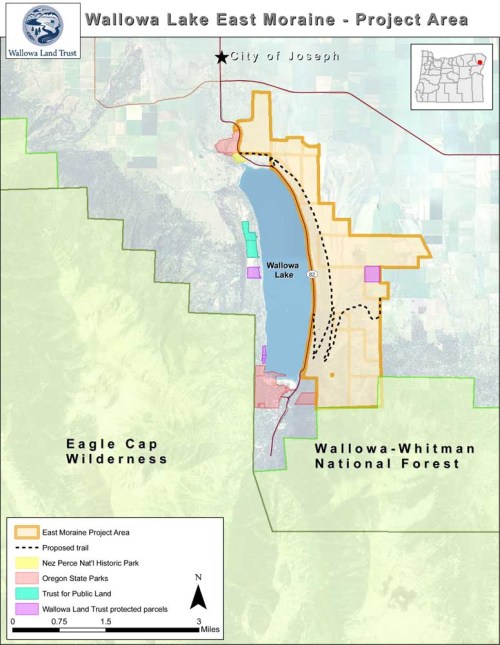Congress gives Land and Water Conservation Fund three more years
Published 3:09 pm Wednesday, December 16, 2015

- Congress gives Land and Water Conservation Fund three more years
A local land trust is in line to receive $3 million to protect the East Moraine of Wallowa Lake after Congress agreed to renew the Land and Water Conservation Fund for three more years.
Created in 1965, the LWCF collects fees from offshore oil and gas drilling and uses the money to help state and local governments buy, preserve and improve recreation on natural lands.
Trending
The fund was allowed to expire Sept. 30, but will be revived as part of the federal omnibus spending bill scheduled for a vote Thursday or Friday in Washington, D.C.
Should the bill pass, it would allocate $450 million to the LWCF in 2016 — a major boost over the current level of $300 million. The Wallowa Land Trust has already applied for funding through the Forest Legacy Program to buy 1,533 acres of East Moraine Wallowa Lake from a private landowner in order to shield the property from development.
The Forest Legacy Program ranked the proposal 10th nationally and awarded the land trust $3 million. But the success was overshadowed by uncertainty over whether the LWCF would survive.
Kathleen Ackley, executive director of the Wallowa Land Trust, said it is a relief to see the fund written back into the federal budget.
“The goal is to preserve the property and put it into county ownership so it can be a community-owned forest,” Ackley said. “The LWCF will help us ensure this icon of northeast Oregon remains undeveloped and locally owned.”
The Wallowa Land Trust is part of a five-pronged coalition dedicated to preserving East Moraine Wallowa Lake, along with Wallowa County, Wallowa Resources, the Trust for Public Land and Oregon State Parks.
Trending
According to their application, the East Moraine is one of the country’s most perfectly formed glacial landscapes and arguably one of the most iconic unprotected areas in Eastern Oregon. Ackley said the wildlife and scenery are a major draw for 700,000 visitors to Wallowa County each year.
Yet 3,000 acres of the East Moraine are under private ownership, with 60 percent owned by the Ronald C. Yanke Family Trust of Boise. The family trust had expressed a desire to either sell or develop the property, which is when the Wallowa Lake Moraines Partnership stepped in.
The partnership is still negotiating a final price with the family trust. Ackley said $3 million will only cover a portion of the bill. The rest, she said, must come from non-federal sources.
“This, for us, is a community treasure we want to see continued under local ownership and contributing to the local economy,” Ackley said.
As a working landscape, Ackley said the land would continue to include open access, as well as grazing and timber harvest, to contribute back to the local economy.
Meanwhile, the Kimball family of Washington — brothers Fred, Frank and Steve — recently donated nine acres of their own moraine property to the land trust for preservation.
Kelley Beamer, executive director of the Portland-based Coalition of Oregon Land Trusts, said she was happy to see the LWCF extended, calling it the single-most important land acquisition fund in the country.
However, Beamer said the organization will continue to strive toward a permanent fix for the fund, rather than punting it three years down the road.
“It doesn’t solve the long-term issue,” Beamer said.
Sen. Ron Wyden, D-Oregon, said he will continue to fight to make LWCF funding permanent.
“These protections are especially important in our state where hunting, fishing and camping are in our DNA as Oregonians, and where so many local recreation jobs are supported by all those activities,” Wyden said.
In other developments from the federal omnibus spending bill:
• Wildfire funding has been bolstered for 2016, including a $600 million reserve account that can be rolled over in case of another devastating fire season. The additional fund is meant to limit the practice of “fire-borrowing,” where the Forest Service and Bureau of Land Management are forced to shift money from other programs to cover the cost of firefighting.
Both Sen. Wyden and Rep. Greg Walden, R-Oregon, have promoted bills that would end fire-borrowing in the long term by creating special disaster relief funds for firefighting. Walden’s favored legislation also called for fast-tracking forest thinning projects under certain criteria. That bill, known as the Resilient Federal Forests Act, passed the House in July but stalled in the Senate.
• Funding has also been maintained at the Columbia Plateau Conservation Research Center north of Pendleton, part of the U.S. Department of Agriculture’s Agricultural Research Service.
Earlier this year, it appeared the local ARS station would lose $911,000, roughly half its annual funding, as the current administration proposed shifting dollars to what they deemed higher priority projects within the agency.
Had that happened, the Columbia Plateau research station would have been forced to lay off three of five staff scientists and end its research project for no-till farming of winter wheat. Instead, Sens. Wyden, Jeff Merkley and Rep. Walden all pushed back against the cuts and funding was ultimately saved.
Merkley, the top Democrat on the Senate Agriculture Appropriations Subcommittee, drafted a bill including language to fund the ARS.
“Supporting local agricultural research that can respond directly to the challenges and opportunities our farmers and ranchers face is essential to strengthening our economy,” Merkley said.
———
Contact George Plaven at gplaven@eastoregonian.com or 541-966-0825.









